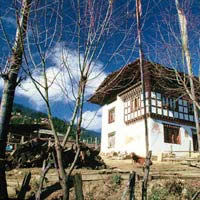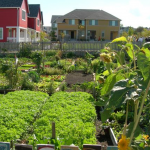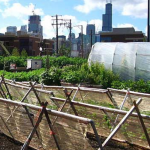The right roof for a ‘food-price-crisis decade’
Urban farming is touted for its resilience to growing threats.
Will your roof soon have leeks?
 When I was in Bhutan, I was interested to see they build their houses over their barns. The ground floor is a granary, stable, chicken coop, whatever. A few barn smells aside, the home upstairs can be spacious, airy, even grand. Many other cultures combine their home and agricultural buildings in different ways.
When I was in Bhutan, I was interested to see they build their houses over their barns. The ground floor is a granary, stable, chicken coop, whatever. A few barn smells aside, the home upstairs can be spacious, airy, even grand. Many other cultures combine their home and agricultural buildings in different ways.
And Americans will soon be doing so too, according to Forbes Magazine‘s predictions for the next decade:
“2018: 20% of all food consumed in U.S. cities
comes from rooftop and parking lot farms.”
Why? Forbes reports elsewhere about the causes.
“The USDA’s annual Outlook Forum usually draws a trickle of insiders, but on February 24 the venue was overrun with 2,000 attendees. Chief economist Joseph Glauber warned of record farm prices for corn, wheat, and soyabeans for 2011, and resulting US food inflation.
“Some of the problems are systemic. For example, the Arab revolt has driven the price of oil to well above $100, and transportation is a significant component of the retail cost of food.
“We are looking at a high-food-price period, perhaps even a food-price-crisis decade.”
 No wonder they’re heading for the rooftops. Urban farms minimize transportation costs. If owned by their customers, they can ignore competing demand from out-of-towners and provide a more secure source if food supplies are interrupted. And if they are indoors, urban farms can be engineered to be energy- and water-efficient, so less vulnerable to drought than outdoor irrigation, less vulnerable to fuel prices than tractor-dependent fields. Solar glazing makes them pest-free and largely oblivious to the seasons.
No wonder they’re heading for the rooftops. Urban farms minimize transportation costs. If owned by their customers, they can ignore competing demand from out-of-towners and provide a more secure source if food supplies are interrupted. And if they are indoors, urban farms can be engineered to be energy- and water-efficient, so less vulnerable to drought than outdoor irrigation, less vulnerable to fuel prices than tractor-dependent fields. Solar glazing makes them pest-free and largely oblivious to the seasons.
Hey, and it looks like vertical farmers get to wear those neat lab coats instead of overalls.
Our local university is about to install an experimental indoor mini-farm, and you can find lots of designs out there, from the prosaic to the futuristic.
Whether or not there are flat roofs or empty parking lots in your neighborhood, you may have an urban farm cooperative in your future.



